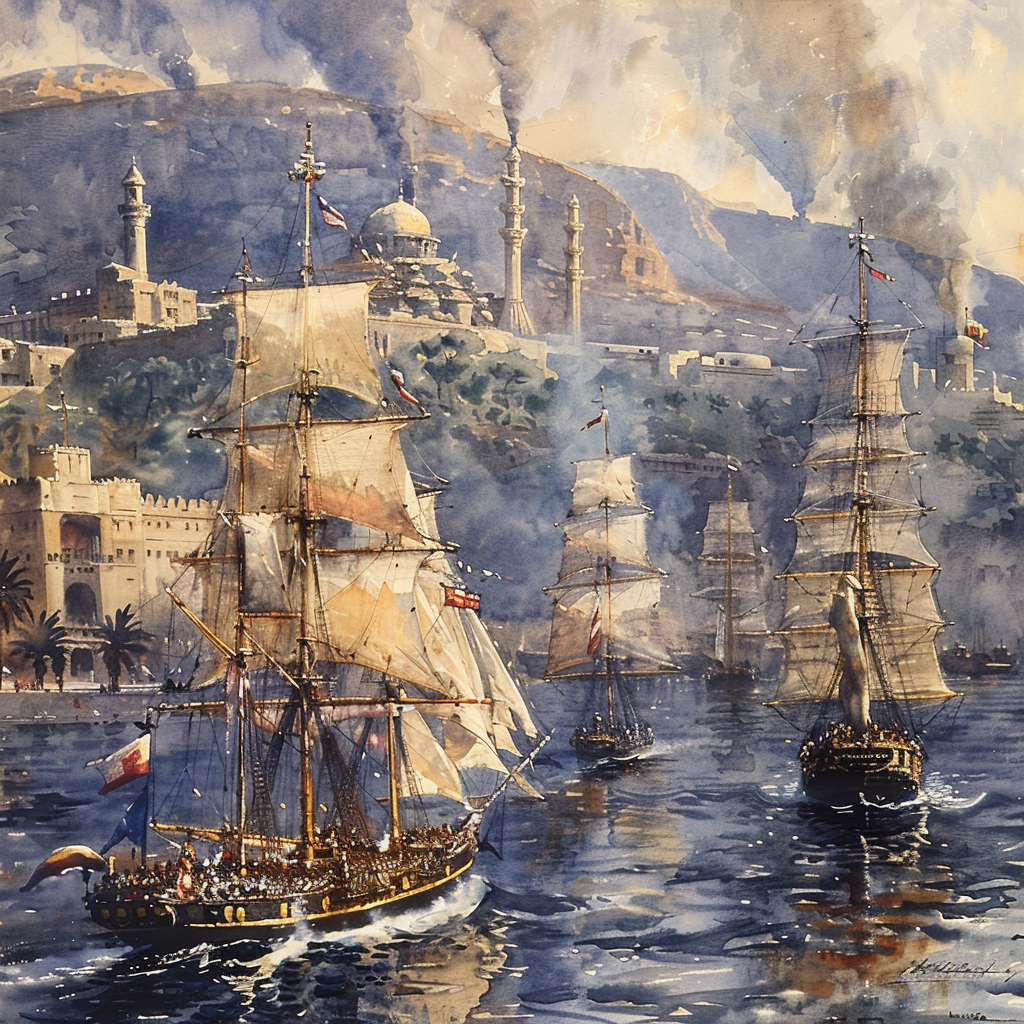In the early 19th century, the Mediterranean witnessed a pivotal conflict that underscored the changing dynamics of power, ambition, and intervention. At the heart of this transformation was Muhammad Ali Pasha, the Ottoman governor of Egypt, whose visionary ambitions extended far beyond the confines of his governorate. His quest for expansion set the stage for a significant military engagement—the Greek Campaign of 1824-1827.
This period marked not only the rise of Muhammad Ali as a formidable force in the region but also highlighted the emerging influence of European powers in Ottoman territories. The involvement of Britain, France, and Russia in the Greek War of Independence was a testament to the strategic importance of the Eastern Mediterranean and the ideological motivations underpinning foreign intervention.
Key figures such as Muhammad Ali’s son, Ibrahim Pasha, and the significant battles like the Siege of Missolonghi, alongside diplomatic manoeuvres at the Battle of Navarino, paint a complex picture of ambition, resistance, and geopolitical realignment. This narrative delves into the intricate details of Muhammad Ali’s failed Greek campaign and the consequential European intervention, exploring the motivations, actions, and aftermath of this historic endeavour.
Muhammad Ali’s Strategic Expansionist Vision
Military Reforms and Modernization
Muhammad Ali Pasha’s tenure as the ruler of Egypt is distinguished by his profound commitment to modernizing his armed forces. Recognising the necessity of a strong military to realise his expansionist goals, he embarked on comprehensive reforms inspired by European models. By 1823, he had instituted conscription within Egypt, a move that significantly bolstered his army’s numbers. This was complemented by the establishment of military academies that aimed to educate a new generation of officers in contemporary warfare techniques. The engagement of French military advisors further underscored his dedication to modernization, introducing new training regimes and tactical approaches that would transform the Egyptian army into a formidable fighting force in the region.
Ambitions Beyond Egypt
Muhammad Ali’s vision extended well beyond the borders of Egypt. His ambitions were fuelled by a desire to control strategic territories that would not only secure Egypt’s supremacy over the Eastern Mediterranean but also weaken the Ottoman Empire’s grip on the region. This drive for expansion saw him eyeing territories in Sudan, the Arabian Peninsula, and notably, the Levant. Each of these targeted areas held strategic and economic significance that, if controlled, would considerably enhance Muhammad Ali’s power and influence, setting the stage for his involvement in the Greek War of Independence.
Involvement in Greece
The Greek War of Independence provided Muhammad Ali with a coveted opportunity to extend his influence into the European territories of the Ottoman Empire. In 1824, he struck an agreement with Sultan Mahmud II, offering to suppress the Greek revolt in exchange for control over Crete and parts of the Peloponnese. This pact led to the deployment of his seasoned forces, under the command of his son, Ibrahim Pasha, to Greece. Ibrahim’s campaign was a calculated move to not only quash the independence movement but also to establish a foothold in the Balkans, thereby extending Muhammad Ali’s reach into southeastern Europe and asserting his emerging power on the international stage.
The Greek Campaign in Detail
Campaign Objectives
Muhammad Ali’s objectives in Greece were twofold: to suppress the burgeoning Greek independence movement and, in doing so, secure valuable territories for Egypt. His sights were set on Crete and significant portions of the Peloponnese, regions that promised to bolster his strategic and economic position in the Eastern Mediterranean. This campaign was not merely a military endeavour but a strategic move to reposition Egypt as a dominant power in the region, challenging both Ottoman and European interests.
Ibrahim Pasha’s Campaign
In February 1825, Ibrahim Pasha landed in the Peloponnese with a formidable force, marking the beginning of an intense military campaign. One of the most notable engagements under his command was the Siege of Missolonghi (1825-1826), a pivotal moment in the Greek War of Independence. The siege demonstrated the brutal tactics employed by Ibrahim Pasha, whose forces encircled the city, cutting off supplies and bombarding the defenders. Despite the fierce resistance from the Greek forces, Ibrahim’s campaign initially made significant gains, capturing key territories and fortresses, showcasing the effectiveness of Muhammad Ali’s modernized military apparatus.
Challenges and Initial Successes
The campaign, while initially successful, faced considerable challenges. The harsh and mountainous terrain of the Peloponnese, unfamiliar to the Egyptian troops, posed significant logistical difficulties. Furthermore, diseases such as malaria decimated the ranks of Ibrahim Pasha’s forces, sapping the strength of his army. Despite these obstacles, the Egyptian forces managed to secure strategic victories and establish control over crucial regions. These successes, however, were to be overshadowed by the intervention of European powers, which would ultimately dictate the campaign’s fate. Ibrahim Pasha’s initial triumphs in Greece underscored the potential for Muhammad Ali’s vision to reshape the Eastern Mediterranean, albeit temporarily.
European Powers’ Motivations and Intervention
Motivations for Intervention
The decision by Britain, France, and Russia to intervene in the Greek War of Independence was driven by a complex mix of ideological, strategic, and public pressure factors. Ideologically, the notion of Philhellenism, a romanticised interest in ancient Greek culture and sympathy for the Greek Christian subjects rebelling against their Muslim Ottoman rulers, had taken root among the European public and elites. Strategically, weakening the Ottoman Empire aligned with the long-term interests of these powers, each seeking to expand their influence in the Eastern Mediterranean. Additionally, public opinion in Europe was fervently in favour of the Greek cause, pressuring governments to take action.
Navarino and Diplomatic Actions
The climax of European intervention came with the Battle of Navarino on October 20, 1827, a decisive naval engagement where the combined fleets of Britain, France, and Russia destroyed the Egyptian-Ottoman fleet. This battle was a turning point, not just tactically but also symbolically, showcasing European willingness to use military force to influence the outcome of the Greek struggle for independence. The aftermath of Navarino saw intensified diplomatic efforts by the European powers to formalize Greek independence, culminating in the 1830 London Protocol that established an independent Greek state. This series of events underscored the limitations of Muhammad Ali’s power when confronted with unified European opposition.
Impact on Muhammad Ali
The loss at Navarino and the subsequent European diplomatic pressures represented a significant setback for Muhammad Ali. The destruction of his fleet and the withdrawal of his forces from the Greek mainland by October 1828 marked the failure of his Greek campaign. This outcome not only curtailed his ambitions in the Eastern Mediterranean but also demonstrated the vulnerability of his military might against a coalition of European powers. The intervention and its aftermath were a sobering reminder of the emerging international order, where European interests and interventions could decisively shape regional conflicts.
Consequences of the Campaign’s Failure
Immediate Impact on Muhammad Ali’s Ambitions
The failure of the Greek campaign had immediate and profound implications for Muhammad Ali’s expansionist agenda. The withdrawal of his forces and the loss of his naval capabilities significantly weakened his position both regionally and in the eyes of the Ottoman Empire. This setback disrupted his plans for further territorial acquisitions and underscored the limitations of his military power when faced with European intervention. The campaign’s failure not only halted his advance into the Balkans but also dampened his aspirations for dominance in the Eastern Mediterranean, forcing a recalibration of his strategic objectives.
Long-Term Geopolitical Shifts
The repercussions of the failed Greek campaign extended well beyond the immediate loss of military prestige for Muhammad Ali. It marked a pivotal moment in the decline of the Ottoman Empire’s influence in the region and the rise of European powers as the arbiters of the Eastern Mediterranean’s geopolitical landscape. The successful intervention by Britain, France, and Russia in the Greek War of Independence signalled a shift towards a new international order where European nations would increasingly impose their will on the Ottoman territories. Furthermore, the establishment of an independent Greek state in 1832 laid the groundwork for the emergence of nationalism as a powerful force, reshaping the region’s political boundaries and identities.
Rise of Nationalism and European Influence
The Greek campaign and its aftermath significantly contributed to the rise of nationalism across the Ottoman territories, inspiring other ethnic and national groups to seek autonomy or independence. This shift not only fragmented the Ottoman Empire’s control over its diverse populations but also provided European powers with opportunities to further extend their influence through diplomatic, military, and economic means. The intervention in Greece became a precedent for future European involvement in Ottoman affairs, setting a pattern that would continue throughout the 19th century, fundamentally altering the balance of power and the nature of international relations in the region.
The failed Greek campaign thus had far-reaching consequences, not only for Muhammad Ali and his dynasty but also for the broader Eastern Mediterranean. It underscored the complex interplay between local ambitions and international dynamics, heralding a new era of European dominance and the gradual dissolution of the Ottoman Empire’s control over its territories.
In reflecting on the ambitious yet ultimately failed Greek campaign of Muhammad Ali and the consequential European intervention, it becomes evident how this historical episode served as a microcosm for the shifting dynamics of power and influence in the early 19th century Eastern Mediterranean. Muhammad Ali’s vision of expanding his dominion collided with the strategic and ideological interests of the European powers, leading to a significant realignment of the region’s geopolitical landscape. The intervention by Britain, France, and Russia not only marked the decline of Ottoman hegemony but also heralded the rise of nationalism and the increasing sway of European nations in determining the fate of territories within the Ottoman realm. This episode underscores the complexity of historical shifts, where ambitions, strategic interests, and the quest for independence intertwine, shaping the course of nations and regions.

